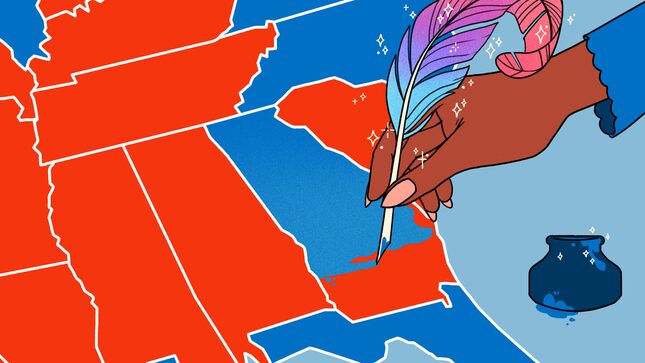
Illustration: Chelsea Beck/GMG
It’s both fitting and unsurprising to me, as somebody who has spent years reading and covering the genre, that a romance novelist was deeply involved in the long, patient efforts to flip Georgia blue. While outsiders to the romance genre seem perpetually surprised to learn about Stacey Abrams’s writing career as Selena Montgomery, insiders see perfect symmetry. Romance writers are driven, unbelievably productive, and regularly craft clockwork-tight plots that maintain suspense even when we all know that the main characters will ultimately live happily ever after—a skill set that translates to all sorts of other spheres, including grassroots organizing. What’s a plot, if not a plan?
And so it’s also fitting that this year the romance community has shown up en masse to support Abrams’s efforts with both phone banking and a massive fundraising effort. It’s the culmination of a journey inside “Romancelandia,” as those within the genre frequently refer to its community, as readers and writers have been ever-more explicitly engaged with progressive politics in their books, on social media, and in their community. Happily ever afters have always been political, of course, but the conversation has ratcheted up several levels in recent years. As a genre traditionally marginalized within the literary universe and even within popular culture—all those Fabio jokes—romance is accustomed to sticking together and fighting anybody who would trash them. With two recent efforts, they’re turning that spirit and their frankly intimidating organizational skills toward American electoral politics.
One of these organizing efforts, a phonebanking initiative dubbed “Fated States,” was born from the blow of losing Ruth Bader Ginsburg as Supreme Court Justice. Romance novelist Sarah MacLean and critic Jen Prokop run Fated Mates, a podcast dedicated to the genre. It got its start with a reread of the sprawling, utterly wild 18-book paranormal romance series Immortals After Dark by Kresley Cole, which features the common paranormal trope of couples who are destined for one another, despite any number of major barriers to their happily ever after—hence the title. But now MacLean and Prokop range further afield, from specific tropes to special episodes in the wake of the Kavanaugh hearing and Ginsburg’s death, basically raging about politics. “I don’t think Jen and I have hidden our politics… really ever,” MacLean told Jezebel over Zoom; Prokop agreed dryly: “We’ve probably not cultivated an audience of apolitical people.”
-

-

-

-

-

-

-

-

-

-

-

-

-

-

-

-

-

-

-

-

-

-

-

-

-

-

-

-

-

-

-

-

-

-

-

-

-

-

-

-








































